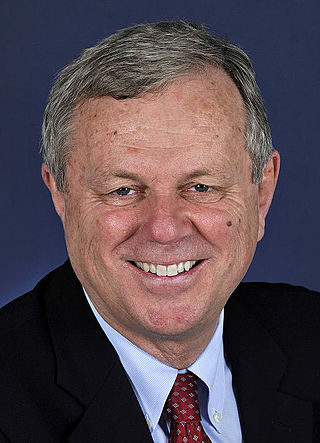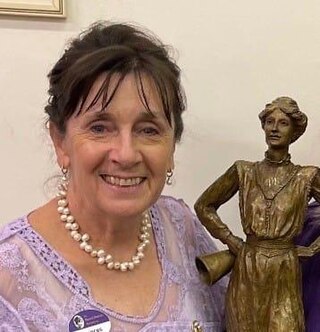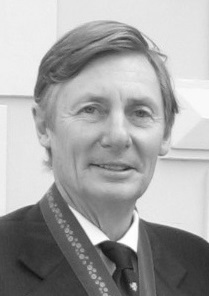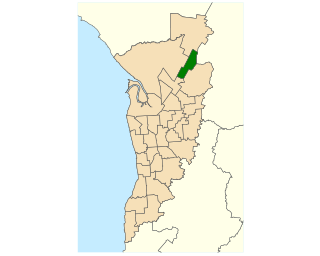Related Research Articles
Martyn John Evans, is a former South Australian independent and Australian Labor Party state and federal politician.
The Division of Mayo is an Australian electoral division located to the east and south of Adelaide, South Australia. Created in the state redistribution of 3 September 1984, the division is named after Helen Mayo, a social activist and the first woman elected to an Australian University Council. The 9,315 km2 rural seat covers an area from the Barossa Valley in the north to Cape Jervis in the south. Taking in the Adelaide Hills, Fleurieu Peninsula and Kangaroo Island regions, its largest population centre is Mount Barker. Its other population centres are Aldgate, Bridgewater, Littlehampton, McLaren Vale, Nairne, Stirling, Strathalbyn and Victor Harbor, and its smaller localities include American River, Ashbourne, Balhannah, Brukunga, Carrickalinga, Charleston, Cherry Gardens, Clarendon, Crafers, Cudlee Creek, Currency Creek, Delamere, Echunga, Forreston, Goolwa, Gumeracha, Hahndorf, Houghton, Inglewood, Kersbrook, Kingscote, Langhorne Creek, Lobethal, Macclesfield, McLaren Flat, Meadows, Middleton, Milang, Mount Compass, Mount Pleasant, Mount Torrens, Mylor, Myponga, Normanville, Norton Summit, Oakbank, Penneshaw, Piccadilly, Port Elliot, Second Valley, Springton, Summertown, Uraidla, Willunga, Woodchester, Woodside, Yankalilla, and parts of Birdwood, Old Noarlunga and Upper Sturt.

The state election for the 51st Parliament of South Australia was held in the Australian state of South Australia on 18 March 2006 to elect all members of the South Australian House of Assembly and 11 members of the South Australian Legislative Council. The election was conducted by the independent State Electoral Office.

The Division of Wakefield was an Australian electoral division in the state of South Australia. The seat was a hybrid rural-urban electorate that stretched from Salisbury in the outer northern suburbs of Adelaide at the south of the seat right through to the Clare Valley at the north of the seat, 135 km from Adelaide. It included the suburbs of Elizabeth, Craigmore, Munno Para, and part of Salisbury, and the towns of Balaklava, Clare, Freeling, Gawler, Kapunda, Mallala, Riverton, Tarlee, Virginia, Williamstown, and part of Port Wakefield.

John Robert Rau SC is an Australian barrister and politician. He was the 12th Deputy Premier of South Australia from 2011 to 2018 and 48th Attorney-General of South Australia from 2010 to 2018 for the South Australian Branch of the Australian Labor Party in the Weatherill cabinet. Rau was the Labor member of the House of Assembly seat of Enfield from the 2002 election until announcing his intention to retire from Parliament on 10 December 2018, and submitting his resignation on 17 December 2018.

Frances Ellen Bedford is an Australian politician who represented the South Australian House of Assembly seat of Florey from 1997 state election until 2022, first for the Labor Party and from 2017 as an independent.

Fisher was an electoral district of the House of Assembly in the Australian state of South Australia. It was created in 1970 and named after Sir James Fisher, a colonial politician and the first mayor of Adelaide. It was abolished in a 2016 redistribution and its last MP, Nat Cook was elected to represent its replacement, Hurtle Vale, at the 2018 state election. It covers a 94.2 km2 suburban and semi rural area on the southern fringes of Adelaide, taking in the suburbs of Aberfoyle Park, Chandlers Hill, Cherry Gardens, Coromandel East, Happy Valley, Reynella East and parts of Clarendon, O'Halloran Hill and Woodcroft.

State elections were held in South Australia on 9 February 2002. All 47 seats in the South Australian House of Assembly were up for election, along with half of the 22 seats in the South Australian Legislative Council. The incumbent Liberal Party of Australia led by Premier of South Australia Rob Kerin was defeated by the Australian Labor Party led by Leader of the Opposition Mike Rann. The Labor Party won 23 out of 47 seats, and then secured the one more seat it needed for a majority by gaining the support of independent Peter Lewis.
State elections were held in South Australia on 11 December 1993. All 47 seats in the South Australian House of Assembly were up for election. The incumbent Labor government, led by Premier Lynn Arnold, was defeated by the Liberal Opposition, led by Dean Brown, in a landslide victory. The Liberals won what is still the largest majority government in South Australian history.

State elections were held in South Australia on 25 November 1989. All 47 seats in the South Australian House of Assembly were up for election. The incumbent Australian Labor Party led by Premier of South Australia John Bannon defeated the Liberal Party of Australia led by Leader of the Opposition John Olsen. Labor won 22 out of 47 seats, and secured a majority of 24 with the support of two Independent Labor members.

State elections were held in South Australia on 7 December 1985. All 47 seats in the South Australian House of Assembly were up for election. The incumbent Australian Labor Party led by Premier of South Australia John Bannon increased its majority, and defeated the Liberal Party of Australia led by Leader of the Opposition John Olsen.

State elections were held in South Australia on 6 November 1982. All 47 seats in the South Australian House of Assembly were up for election. The incumbent Liberal Party of Australia led by Premier of South Australia David Tonkin was defeated by the Australian Labor Party led by Leader of the Opposition John Bannon.

State elections were held in South Australia on 15 September 1979. All 47 seats in the South Australian House of Assembly were up for election. The incumbent Australian Labor Party led by Premier of South Australia Des Corcoran was defeated by the Liberal Party of Australia led by Leader of the Opposition David Tonkin.

State elections were held in South Australia on 17 September 1977. All 47 seats in the South Australian House of Assembly were up for election. The incumbent Australian Labor Party led by Premier of South Australia Don Dunstan won a fourth term in government, defeating the Liberal Party of Australia led by Leader of the Opposition David Tonkin.

State elections were held in South Australia on 10 March 1973. All 47 seats in the South Australian House of Assembly were up for election. The incumbent Australian Labor Party led by Premier of South Australia Don Dunstan won a second term in government, defeating the Liberal and Country League led by Leader of the Opposition Bruce Eastick.
The Emergency Committee of South Australia was the major anti-Labor grouping in South Australia at the 1931 federal election.
A by-election was held for the South Australian House of Assembly seat of Elizabeth on 9 April 1994. This was triggered by the resignation of former state Labor MHA Martyn Evans, who moved to the federal seat of Bonython at the 1994 by-election. The seat, created at the 1969 redistribution and first contested at the 1970 state election, was held by Labor from 1970 until 1984, when Evans won it as an independent Labor candidate. In 1993, he rejoined the Labor Party.

Elizabeth is a single-member electoral district for the South Australian House of Assembly. It first existed from 1970 to 2006, when its boundaries were moved south and east and it was renamed to Little Para. The 2016 redistribution moved it further north and renamed it back to Elizabeth for the 2018 election. The district is in the northern suburbs of Adelaide, and named for the suburb of Elizabeth.

The 2018 South Australian state election to elect members to the 54th Parliament of South Australia was held on 17 March 2018. All 47 seats in the House of Assembly or lower house, whose members were elected at the 2014 election, and 11 of 22 seats in the Legislative Council or upper house, last filled at the 2010 election, were contested. The record-16-year-incumbent Australian Labor Party (SA) government led by Premier Jay Weatherill was seeking a fifth four-year term, but was defeated by the opposition Liberal Party of Australia (SA), led by Opposition Leader Steven Marshall. Nick Xenophon's new SA Best party unsuccessfully sought to obtain the balance of power.

A by-election for the seat of Fisher in the South Australian House of Assembly was held on 6 December 2014. The by-election was triggered by the death of independent MP Bob Such on 11 October 2014. Originally elected to Fisher for the Liberal Party of Australia at the 1989 election, defeating the one-term Australian Labor Party MP Philip Tyler, Such left the party in 2000.
References
- ↑ History of South Australian elections, 1857-2006 - by Dean Jaensch - ISBN 978-0-9750486-3-4
- ↑ History of South Australian Elections 1857 - 2006 Volume 1: ECSA
- ↑ "Elizabeth – SA 2022". 6 September 2021.
- ↑ "Elizabeth - SA Electorate, Candidates, Results". Australian Broadcasting Corporation .